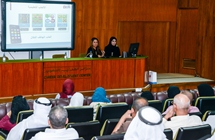

The Institute of Public Administration (BIPA) has finished initial phase of joint cooperation with the Electricity and Water Authority (EWA), which aims to train all staff of the EWA electronically, as this step is considered part of BIPA's strategy to disseminate the culture of e-training, and to provide and facilitate the training process, to reach the largest possible number of public sector employees, where the Institute is seeking to fulfill the training needs for government employees through combined training (traditional and electronic).
Senior Director of Basic Development and Creative Learning at the Institute Mohammed Al-Saba'a stated that this joint cooperation came due to the renowned attributes of the e-training that make it the best tool suited to meet all the training needs of EWA staff amounted to approximately 4,000 employees within the various functional levels, in an interactive environment that provides the same benefits offered by the traditional training of the training material but with modern techniques away from the usual routine.
Mr. Al-Saba'a mentioned that the initial phase include introductory meeting with the staff of the EWA and to inform them about the e-training, the system of the training process management and the registration steps and instructions in addition to some important remarks to pass the e-training session successfully, noting that the e-training strategy of the Institute seeks to establish an integrated electronic environment that provides training opportunities and support individual learning, which would be a leap in the training services for public sector employees.
Mr. Al-Saba'a added that due to the fact that e-training is one of the new methods in training, therefore the need is urgent to increase the degree of awareness among trainees and officials to increase the turnout for this type of training, especially after the decision of the Civil Service Bureau (CSB) for adopting e-training hours which came to affirm that the e-training strategy of the Institute enjoys a confidence that qualifies it for expansion in the future to serve the training needs of public sector employees in the Kingdom of Bahrain.
It is noteworthy that the e-training is characterized by many features including: improving the level of training, saving time and effort, facilitate training for trainees, facilitate training for those in charge of training, increase the number of trainees, competition in training, getting rid of barriers to the frequent traditional training, allowing the trainee to repeat training activities, trainees are not missing training opportunities due to illness, overcome the difficulties of travel and accommodation, leaving the work and the interruption of income due to the complete abandonment of work in favor of training, in addition to the possibility of investing in various electronic websites intended for training and updating of information, developing computer skills for trainees through e-training and generate positive trends for them towards these modern training technological techniques.
